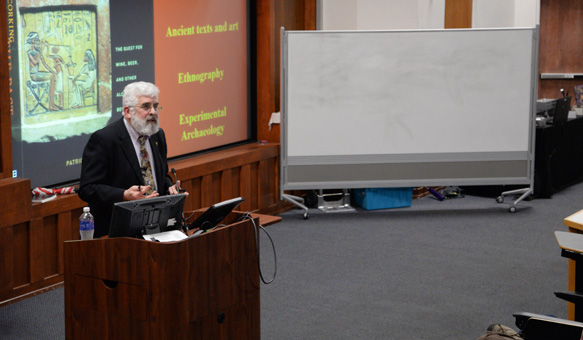The event, called “Uncorking the Past: Fermentation as Earth’s Earliest Energy System and Humankinds First Biotechnology,” was part of the Evolution Working Group’s 10th year of the Alabama Lecture on Life’s Evolution series, or ALLELE.
“Dr. Patrick McGovern came to my attention a few years ago when I came across a Smithsonian article,” said Christopher Lynn, a UA anthropology professor and director of the evolutionary studies minor. “I imagine, like many of you, the title ‘beer archeologist’ was captivating to me.”
McGovern, an anthropologist and archaeologist, travels the globe studying the alcoholic beverages of ancient peoples and the significance of fermented products in the evolution of humans. His work was documented most recently in his book “Uncorking the Past: The Quest for Wine, Beer, and Other Alcoholic Beverages.”
McGovern’s lecture traced alcohol from its existence as a natural compound found in clouds to its more familiar existence in ripening fruits and grains. Long before humans began enjoying fermented foods, alcohol was a huge part of animal life, McGovern said. He analyzes the development of alcohol from the Stone Age to modern years. During the lecture, he spoke of his experiences recreating ancient alcohols by sampling the chemical compounds of alcohol residues on pottery.
“This is one of the fun parts of my job,” he said. “You can’t really understand ancient beverages unless you’ve tasted modern beverages.”
McGovern said the body produces energy when it breaks down yeast from alcohol fermentation. Both humans and animals find this appealing and have similar reactions to the mind-altering affects of alcohol. To support his point, he showed a video highlighting the drunken behavior of African animals after consuming fermented fruit.
“We can observe with various fruit trees, animals like monkeys, birds, and even elephants gorging themselves on the high-energy alcohols found in fermenting fruits,” he said. “They even experience the same mind-altering affect that we do as humans.”
McGovern said in the past, people who drank alcohol had more children and lived longer lives. He referred to groups who put medicinal herbs in the alcohol and said it was safer to drink alcohol versus water because the yeast killed all the harmful microorganisms.
“I think we still have a lot more to learn about all the enzymes that are at work and how to measure the impact it’s had on our cultures in terms of language, dance, music and so forth,” he said.
McGovern’s work, learning about ancient beverages, yields more than scientific and historical value. By using chemistry to team up with Dogfish Head Brewery, McGovern helped craft eight “Ancient Ales” – modern beverages crafted using ancient recipes.
The Evolutionary Studies Club helped promote and facilitate the lecture event and Lynn spoke about their Darwin Day Colloquium, which will feature speeches, videos and songs.
“This year, we’re really pushing for evolutionary topics as well as academic topics,” said Taylor Burbach, a senior majoring in anthropology and president of the Evolutionary Studies Club.
McGovern said in the future he hopes to explore the history of fermented drinks in other ancient cultures.









